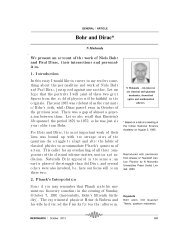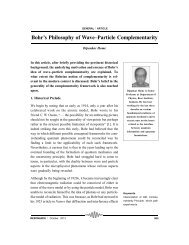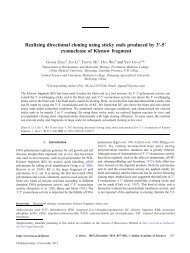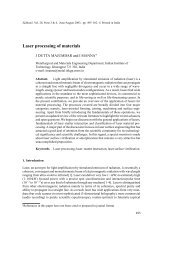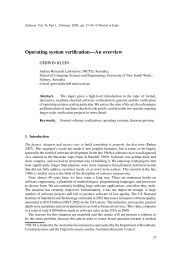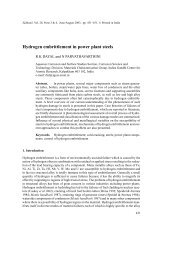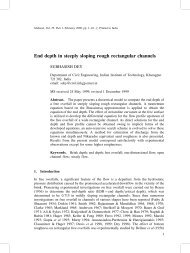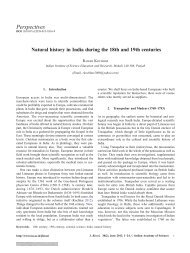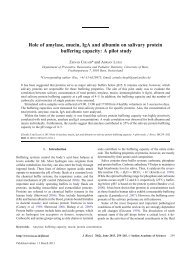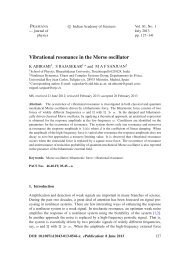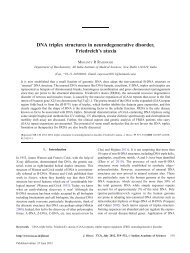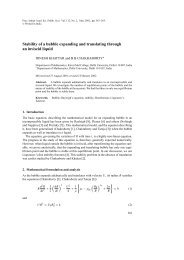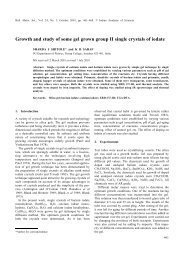Trained Scientific Women Power: How Much are we Losing and Why?
Trained Scientific Women Power: How Much are we Losing and Why?
Trained Scientific Women Power: How Much are we Losing and Why?
You also want an ePaper? Increase the reach of your titles
YUMPU automatically turns print PDFs into web optimized ePapers that Google loves.
EXECUTIVE SUMMARY<br />
The study “<strong>Trained</strong> <strong>Scientific</strong> <strong>Women</strong> <strong>Po<strong>we</strong>r</strong>: <strong>How</strong><br />
<strong>Much</strong> Are We <strong>Losing</strong> <strong>and</strong> <strong>Why</strong>?” was conducted to<br />
underst<strong>and</strong> the reasons for the loss of trained women<br />
scientists <strong>and</strong> to identify strategies <strong>and</strong> provisions<br />
to retain them in Science.<br />
The survey was conducted across India with 568<br />
women scientists <strong>and</strong> 226 men scientists who had a<br />
PhD in Science, Engineering or Medicine. The survey<br />
covered women <strong>and</strong> men who <strong>we</strong>re currently<br />
engaged in scientific research <strong>and</strong> teaching, engaged<br />
in jobs other than scientific research <strong>and</strong> teaching<br />
<strong>and</strong> even those who <strong>we</strong>re currently not employed.<br />
The survey covered over 100 questions on personal<br />
<strong>and</strong> family characteristics, educational background,<br />
employment details, organizational atmosphere <strong>and</strong><br />
research <strong>and</strong> productivity factors. The main findings<br />
of the study <strong>and</strong> the recommendations drawn from<br />
it <strong>are</strong> given below:<br />
SUMMARY AND RECOMMENDATIONS<br />
<strong>Women</strong> Scientists: <strong>Women</strong> in Science<br />
Research(WIR), <strong>Women</strong> not in Science<br />
Research (WNR), <strong>and</strong> <strong>Women</strong> not Working<br />
(WNW)<br />
The complexity of developing interventions to retain<br />
women in Science stems from the diversity in the<br />
characteristics of women scientists across the<br />
different sub-groups of women in Science. The<br />
differences also, perhaps, stem from the different<br />
priorities the groups have because even with several<br />
commonalities among demographic profiles of the<br />
women, differences on important aspects such as<br />
professional prospects vs. childc<strong>are</strong> or family<br />
responsibilities <strong>are</strong> seen.<br />
• An analysis of sample details reveals that while a<br />
majority of all the three sub-groups of women <strong>we</strong>re<br />
married, the highest percentage of WIR <strong>we</strong>re<br />
‘never married’ (14.1 per cent). <strong>Women</strong> who <strong>we</strong>re<br />
‘never married’ <strong>are</strong> distributed across all age<br />
cohorts. A majority of the three sub-groups also<br />
reported having children who <strong>we</strong>re over 15 years.<br />
<strong>How</strong>ever more WNW across all age groups had<br />
younger children (bet<strong>we</strong>en 0-5 years) comp<strong>are</strong>d<br />
to the other two groups.<br />
• A majority of the women also reported living in<br />
nuclear families. A significantly higher percentage<br />
of WNW reported having received no help with<br />
childc<strong>are</strong>. Thus for WNW, the absence of support<br />
either by choice or compulsion could perhaps be<br />
an important reason for their dropping out of<br />
Science. In contrast, WIR <strong>and</strong> WNR reported<br />
receiving help from a combination of agencies like<br />
their p<strong>are</strong>ntal family, marital family <strong>and</strong><br />
professional help.<br />
• Interestingly, a significantly higher proportion of<br />
WNW also have had spouses in the same field or<br />
organization, <strong>and</strong> this could have been another<br />
major factor contributing to their dropping out.<br />
• With respect to organizational details, professional<br />
advantages <strong>and</strong> opportunities <strong>and</strong> getting jobs<br />
have been the main factors influencing job<br />
selection. A majority of the responses from all<br />
groups indicated not getting jobs as the<br />
primary reason for not taking up posts<br />
applied to. While more WIR <strong>and</strong> WNR have<br />
indicated better professional prospects as<br />
reasons for not taking up the posts, none of the<br />
responses from WNW indicated this reason.<br />
• With regard to leaving previous jobs, better<br />
professional prospects have been the most<br />
important consideration for WIR <strong>and</strong> WNR,<br />
while the temporary nature of the post has<br />
been the reason most often stated by the<br />
WNW. Family reasons have also been reported<br />
as the an important factor by WNW for leaving<br />
jobs.<br />
• WIR <strong>and</strong> WNR also significantly differed with<br />
respect to reasons for accepting present post. A<br />
greater proportion of WIR have reported<br />
professional advantages as reason for<br />
taking up the post, while for other reasons<br />
such as lack of other suitable options,<br />
freedom <strong>and</strong> autonomy in work,<br />
permanency of position, etc has figured as<br />
an important reason.<br />
• In terms of working hours, both WIR <strong>and</strong><br />
WNR have reported working bet<strong>we</strong>en 40-<br />
60 hours per <strong>we</strong>ek on an average. <strong>How</strong>ever,<br />
a higher per cent of WIR have reported working<br />
for 60 hours or more per <strong>we</strong>ek comp<strong>are</strong>d to WNR,<br />
while a greater per cent of WNR have reported<br />
working bet<strong>we</strong>en 20-40 hours per <strong>we</strong>ek comp<strong>are</strong>d<br />
to WIR.<br />
9



